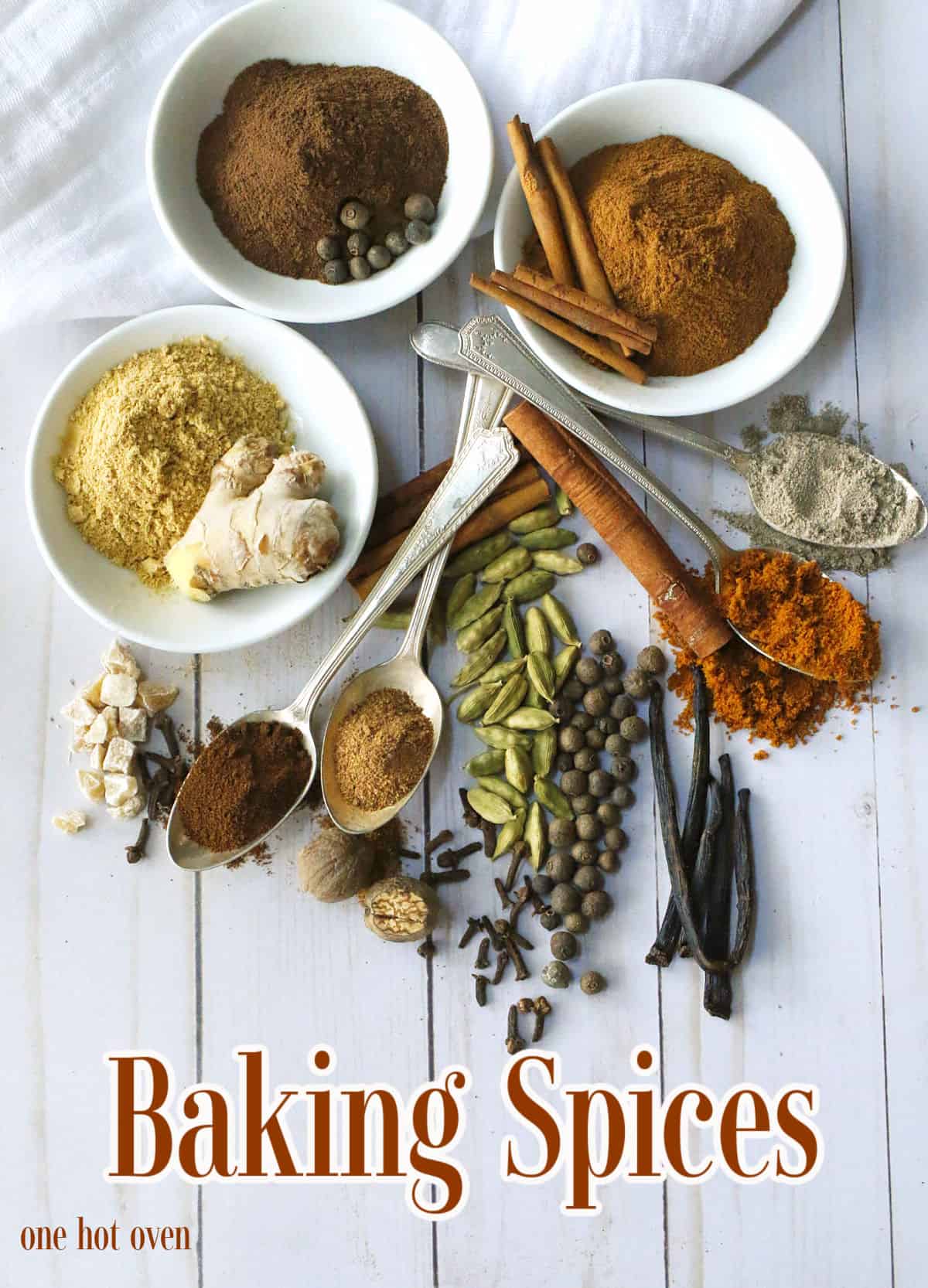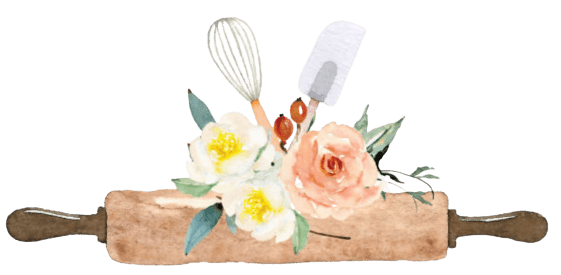This list of essential best baking spices is a baker’s arsenal for creating extraordinary dishes that wow anyone who bites into them.

Want to save this recipe?
Enter your email & I’ll send it to your inbox. Plus, get great new recipes from me every week!
This page may contain affiliate links; please see my disclosure for policy details. I earn commissions if you shop through the links on this page.
Keeping baking essentials on hand in a well-stocked pantry is the key to great cooking and baking, and that includes having some important spices. Although spices have been used for centuries in cooking and baking, I find that most people don’t use them to their full advantage.
Any baker worth their salt knows that adding the right spice to a dessert takes that dish from good to incredible very quickly and easily.
If you want to become a great baker, it may be a simple matter of adding to your spice repertoire. By increasing your knowledge and use of these underutilized gems, you may not only enjoy the baking process more but the final product as well!
✳️ Spice tips!
For your spices to stay the freshest and tastiest, follow these tips
- Store in a dark place
- Store in airtight containers
- Keep the spices away from moisture
- If you have whole spices, grind them when needed
- Keep spices away from heat
Here is your baking spice list
Baking with Spices: The Essentials You Need
I’m guessing you’ve probably used a few common spices before, like cinnamon, allspice, and maybe vanilla. However, you can send your baking skills into the stratosphere by using other, more unusual spices, too. Here’s what you need to know about some of my favorite – and most utilized baking spices. All of these are flavorful dessert spices.
Allspice
Allspice, contrary to its name, is one single spice that comes from the dried berries of the evergreen pimento tree. Its name is derived from the fact that it tastes like a combination of several common brown spices, including cinnamon, cloves, and nutmeg.
Although it can be used in savory dishes as well as sweet, allspice adds a wonderful layer of dimension to spice cakes, gingerbread, and other similar recipes.
Cardamom
This sweet, smoky, spicy, complex, aromatic spice comes from the dried seed pods of certain plants in the ginger family. It’s commonly used in both sweet and savory dishes in Indian and Middle Eastern cuisine, with garam masala being a good example.
There are two main varieties to choose from: green cardamom and black cardamom. Green cardamom is the most common or “pure.”
As a spice, it tends to lose its flavor within just a few short months after grinding, so I recommend buying whole seeds (instead of pre-ground) and grinding them immediately before adding them to your recipes to get the best flavor.
These pretty as can be Rose Petal Shortbread Cookies are flavored with cardamom and topped with crushed rose petals.
Cinnamon
If there’s one spice that’s a must-have, it’s cinnamon. It’s so versatile and has a delicious warm flavor that is a staple in many sweet and savory recipes like our favorite, Cinnamon Crescent Rolls that’s made with just six ingredients.
Most commonly, cinnamon is purchased as a pre-ground spice. However, you can also buy cinnamon sticks and use them whole or grind them up to add a more intense flavor to your dish.
Ginger
The gnarled root of the ginger plant is prized in many cooking applications (like gingerbread or ginger cookies and more!) and can be used in several different ways.
- Ground ginger: the ginger root is dried and ground up to be used as a spice in baking and savory curry recipes. One teaspoon in these Gingerbread Muffins makes them deliciously fragrant.
- Grated ginger: a common way to use fresh ginger, as the skin of the root is very tough. If you want to substitute grated fresh ginger for ground ginger in your recipes use this ratio: 1 Tbsp fresh grated ginger = ¼ tsp ground ginger.
- Candied ginger: ginger that’s often used in desserts and has been cooked in a sugar syrup until it’s tender and dusted with sugar.
Ground cloves
Cloves are a spice made from the dried, unopened flower buds of a tropical evergreen tree. They can be used whole (in simmered dishes like mulled cider) or as a ground spice to lend a strong, aromatic flavor that pairs exceedingly well with cinnamon and nutmeg in many fall and holiday recipes as well as in many savory dishes such as Indian curries.
Mace
I didn’t use mace for the longest time only because I didn’t know anything about it. Big mistake since it’s now one of my favorite “secret weapons” when it comes to baking.
Mace is a yellow-brown spice that comes from the lacy, webbing coating around the nutmeg nut. It tastes much like nutmeg but even better. Its light notes of citrus offer a subtle, bright difference from nutmeg that can elevate almost any dish where you would normally use nutmeg.
Mixed spices
Baking spices can do a lot individually to help a dish taste better, but mix them in certain ways and…wow! Three of my favorite spice mixes are:
- pumpkin pie spice – a blend of warm fall spices that we love as soon as the weather turns cooler: cinnamon, nutmeg, allspice, cloves, and ginger
- apple pie spice – another combination of delicious, warm fall spices: cinnamon, ginger, cardamom, nutmeg, and allspice
- Christmas spices – cinnamon, cloves, nutmeg and ginger make the most delicious spice mix that is used in these delightful Spiced Christmas Cookies.
Nutmeg
Nutmeg is a seed that’s dried for 6-8 weeks before grounding. With its sweet, nutty, warm (with a hint of clove) flavor, nutmeg is used in many puddings, desserts, eggnog, and baked goods recipes such as my all-time favorite Sweet Nut Braided Bread that has a creamy nutmeg-flavored filling.
As you can see with many of these spices, nutmeg can also be used in savory dishes with potatoes, sausage, meats, bechamels, spinach and cheese dishes, or vegetables.
Most people buy and use pre-ground nutmeg, however, similar to cardamom, nutmeg quickly loses its flavor after grinding. For the best flavor, buy whole nutmeg and use a Microplane to grind it yourself when you want to add it to recipes.
Star Anise
Star anise is the star-shaped seed pod from an evergreen shrub in southern China and has been used as a spice for at least 3,000 years. It has a distinct, warm, spicy, sweet strong flavor that’s similar to licorice, clove, and fennel seed and is included in the Chinese five-spice blend.
This spice can be used as a whole pod or ground up. When using the pod, add it to simmering soups, sauces, and marinades and pull it out before serving. Take care to not let it simmer very long because the pods have a very strong flavor that can overpower a dish if cooked too long.
The ground-up version is easier to use as it’s added to recipes much like any other ground spice.
Vanilla
Vanilla is a flavor enhancer that adds a warm, spicy flavor to dishes in a delightful way. While I prefer to use pure vanilla extract or vanilla beans in my baking, you can Learn everything you need to know about vanilla and decide what works best for you.
Make sure to try the different types of vanilla in both your sweet and savory dishes.
Spice Questions
Over time, spices will lose their fragrance and potency. Whole spices will last longer than if they are ground. It is always best to buy smaller amounts of spices so they can be used as soon as possible for the best flavors.
Just know what spices you use the most and buy smaller amounts of occasionally used spices.
Make sure to store your spices in tightly sealed containers to keep out moisture. It’s best not to store them over a stove. The heat from the stove could change the flavor of the spices and possibly cause condensation.
It’s best not to freeze spices because of the condensation.
We are used to baking with spices but most spices are used for both cooking and baking in all types of dishes from around the world.
Sometimes referred to as “Warming Spices,” these include all the spices here, except vanilla. These are spices that have thermogenic properties that raise core body temperature. There are more such as black pepper, cayenne, cumin, and turmeric.

🥄Helpful tools for spices
If you want to grind your own spices an electric spice grinder works the best. This grinder is also good for coffee and herbs. If you are using it interchangeably just make sure to really clean it between uses.
I prefer glass for storing spices and these square-edged glass spice jars have nice tight-fitting metal lids.
For grating nutmeg, cinnamon and ginger a Microplane grater is the perfect tool.
Buy your essential spices
More great baking guides
If you are baking you will want to read this Guide on Using Your Oven for some great tips and tricks.
There are several recipes on baking in a skillet, learn How to Season A Cast-Iron Skillet so it is ready to add your favorite batter.
Don’t forget about your flour. This guide goes over my Favorite Flour to Use In Baking.
More One Hot Oven how to’s
Baking Spices: Final Thoughts
With these essential baking spices stocked in your pantry, you’ll be ready to take almost any baking recipe and make it even more flavorful. Once you start using these spices regularly, prepare yourself for all the requests you’ll receive to make even more yummy deliciousness!
Make sure to add spices when baking your favorite baked goods, like this autumn favorite Pumpkin Spice Sheet Cake.

Subscribe here for more great recipes, and follow One Hot Oven for more tasty sweet and savory recipes! Pinterest | Instagram | Facebook
Thank you for stopping by the One Hot Oven blog. Please leave a comment to say Hello or just let me know what you are baking these days, I always love hearing from fellow bakers. Have any questions or just want to chat about the recipe? My contact information is on my about page, and I’ll be happy to help.
About Jere’
From learning to cook on a farm in Indiana to culinary school in California, my passion for food is never-ending. Turning on my oven to bake something for friends and family is my happy place, and I am glad to be here at One Hot Oven sharing both sweet and savory family-friendly recipes for your cooking and baking inspiration.










This is really helpful! Thanks a lot for this amazing and great recipe! Will surely have this again, super easy to make! Loved it and highly recommended!